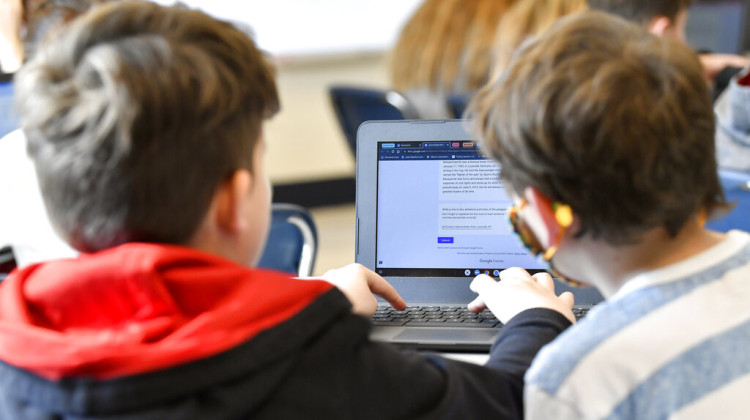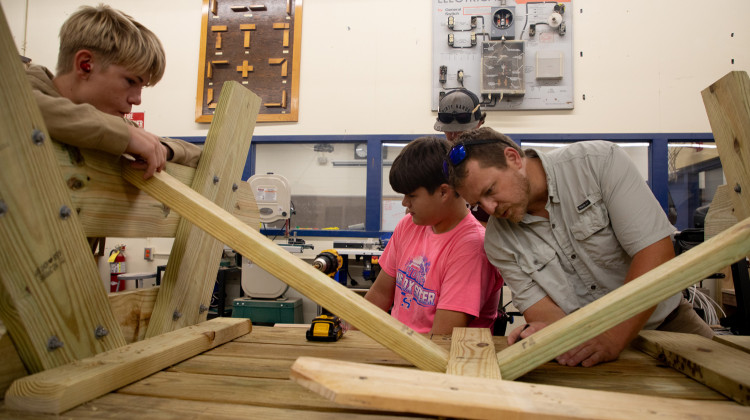
Students at Stonewall Elementary in Lexington, Ky. each summarized a text about boxing champion and Kentucky icon Muhammad Ali then tried to figure out which summaries were penned by classmates and which was written by the chatbot in February 2023.
Timothy D. Easley / AP PhotoThousands of Indiana students and classroom educators took on an assignment to explore artificial intelligence, or AI, this last school year.
State education leaders hoped what they and their teachers learned could lead to future use of AI in classrooms although specific funding for the venture has dried up.
The Department of Education tasked school districts to apply for grant money to try out AI concepts. Department leaders presented some findings from the classroom to the State Board of Education this month.
“If AI is here, how might we leverage AI for the good,” Secretary of Education Katie Jenner said. “How could it help us solve some of the problems?”
Jenner said educators in local school districts inspired the pilot after many approached the department seeking ways to incorporate it ethically.
The program focused on ways to decrease teacher workloads and increase 1-on-1 tutoring for students, Jenner said.
Surveys from the program revealed somewhat positive feedback from educators who put AI to the test for classroom tasks.
But what happens after the pilot could be up to school districts.
Digital learning grants
The state targeted around $2 million in pandemic relief funds to conduct the pilot.
Molly Williams, a spokeswoman for the education department, said there’s no plans to continue the pilot program.
However, some school districts and educators will be able to utilize a Digital Learning Grant through IDOE to continue AI programming and other digital learning opportunities.
They can request up to $50,000 to fund projects tied to AI, game based learning and virtual reality, among other things. The 2024 applications have closed. About 45 school districts and charter schools participated in 2023.
There are also grants to support professional development in artificial intelligence, virtual instruction and integrating technology for educators who spend more than half of their time focused on digital learning.
What did educators in the pilot think of AI?
About 2,500 teachers participated in the AI pilot while only 625 educators responded to a state survey about its successes and failures. Of those, more than half said artificial intelligence had a positive influence on student learning.
Educators put AI to work for classroom tasks, like lesson plans, rubric and assessment creation and to further knowledge of subjects. Schools appeared to have facilitated some feedback from students although there was no formal survey shared by IDOE.
Nearly forty traditional public school districts and charter schools received grants last year to explore AI platforms. They picked the program as long as they met some state requirements.
Schools chose various AI education-focused companies and startups including Amira Learning, SchoolJoy, Edia and Chat for Schools.
All have varied features but differ from generative AI platforms, like ChatGPT. That was an important distinction, Jenner said.
Despite a mostly positive start, educators reported some shortcomings from the platforms.
Heather Herring, a course access specialist for the education department, said educators found bugs in navigating the platforms, microphone usage and speech recognition.
That feedback will be shared with artificial intelligence providers directly, Herring said.
What comes next?
Kyungbin Kwon, an Indiana University associate professor, said teachers need continued support and professional development to move forward and try out AI concepts, which could enhance their teaching methods, he said.
“Teachers should understand what's going on and the work functionalities available for them,” Kwon said. “At the time, they may have some kind of sense of judgment about AI integration.”
Kwon studies AI and its impact on students in the classroom. In 2023, Kwon published a study about middle school age students’ conceptions of AI and how they change those impressions during an AI-focused summer camp.
Some educators may be reluctant to introduce AI in the classroom, Kwon said academic integrity is why. But there are ways to use AI for learning, not cheating, he said.
“We cannot block generative AI or other AI tools from students because there are many potentials and benefits,” Kwon said.
Last year, Hamilton Southeastern Schools added the misuse of artificial intelligence to student handbooks. If a student turns in AI-generated work once, like if they create an essay through ChatGPT, they could lose credit for the assignment and have their parents notified.
Students who are dishonest again will be sent to school leaders and may be withdrawn from the class with a failing grade, according to high school handbooks. And HSE is not alone as school districts discover how to manage AI.
“There is a time and effort required for this process.” Kwon said. “Once teachers and administrators see the potential then they may change their mind and then they will have a more positive attitude towards this.”
Rachel Fradette is the WFYI Statehouse education reporter. Contact Rachel at rfradette@wfyi.org.
 DONATE
DONATE






 Support WFYI. We can't do it without you.
Support WFYI. We can't do it without you.